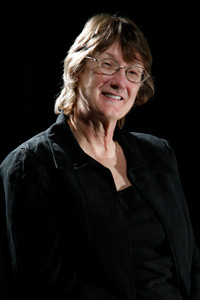Professor Brings Classroom to the Community
NewsJoann Grayson, Ph.D.
Professor, Dept. of Psychology
Hometown: Lancaster, Pa.
Education: B.A. Gettysburg College, Psychology
Ph.D. Washington University (St. Louis), Clinical Psychology

Career Highlights: Dr. Grayson is an accomplished scholar and advocate in the field of child and family abuse. Since joining JMU in 1976, she has helped initiate more than 11 prevention programs in the local community. She served 10 years on the Governor's Advisory Board on Child Abuse and Neglect and since 1981 has been editor and publisher of the Virginia Child Protection Newsletter. Her service-learning approach to teaching places more than 100 JMU students each year in the field, where they gain valuable experience outside the classroom and provide essential help to various community and state agencies. In 2006, she was named Virginia Professor of the Year by the Carnegie Foundation and received the Champion for Children Award from Prevent Child Abuse Virginia. In March, she will be honored as one of eight 2009 Virginia Women in History by the Library of Virginia.
Can you explain your service-learning model?
"Service learning is a little different from volunteering. It has an academic component to it. In addition to working in the field, students do reading that corresponds with their work, research, and they document every day they're in the field, so they do a lot of writing too. They're graded on critical thinking, taking what they learn in class and applying it on site. They're evaluating the effectiveness of meetings they have, coming in for supervision here, getting supervision there, doing a tremendous amount of reading and writing."
What are the benefits of service learning?
"They grow. The students really grow. And watching the students grow, it's wonderful. They grow and they become colleagues. A lot of our current site supervisors are people who went through the program as students. So, it's a nice system. As you get older, your network just expands."
How do you balance the fieldwork and classroom aspects of the system?
"You need both. A student without a proper background is of no use in the field. One is not more valuable than the other. Research is also very important. Our department has the highest number of honors theses of any department at the university. We have several hundred students working on research each year. It's wonderful. If you don't go out and experience what it's like in the field, you can't figure out if that's what you want to do, what you're good at, what you should be doing."
What are the goals for students in your program?
"We have students set their own goals. It's important for them to get some ideas of what they want to accomplish. As a department, we strive for critical thinking, the ability to be poised and polished in oral presentations and writing. The students have to set their own learning agenda."
Why has your approach been so successful at JMU?
"JMU really encourages this type of creativity. The students bring a lot of enthusiasm, and it's getting increasingly diverse. They each bring their unique backgrounds, hopes and dreams to the process. We've got a good group of students."

